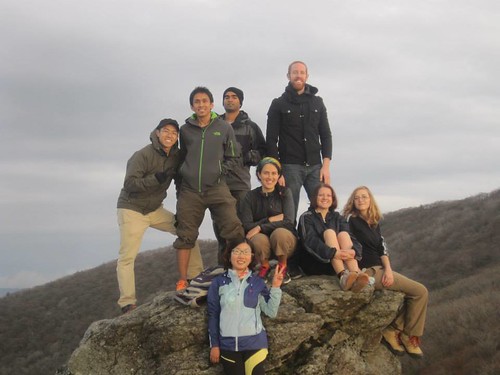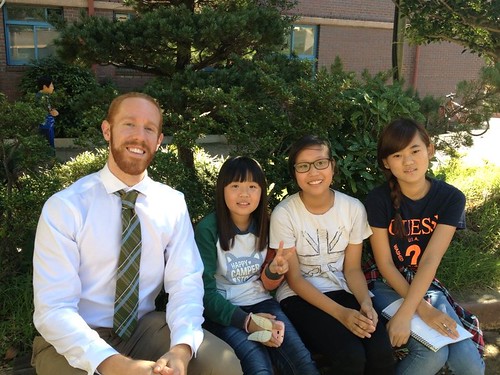Interview With Daniel St. Clair, An American Teacher In South Korea

Please tell us a little about yourself
Hi, I’m Dan. After graduating with a degree in Financial Mathematics & Statistics, I started work at a financial planning company. Two years of sitting in a cubicle staring at spreadsheets wore me down and I decided on a whim to fly to Taiwan and teach English. While there, I discovered I love teaching and decided to make it my career.
Two years later with a California state teaching credential in hand, I’m back at it teaching English in South Korea. When I’m not teaching, I love playing music, staying active, and traveling.
How have you enjoyed teaching in South Korea to date?
Teaching at a public school in South Korea is a strange beast. 40 minute lessons fly by in the wink of an eye and often leave me feeling like a storm just passed through, but the students are so excited and eager to learn that I leave the classroom smiling. Discipline issues arise just as they do in public schools back home and can be difficult to deal with through the language barrier but good lesson planning keeps them in check.
School schedule changes and events are planned at the last minute, forcing me to think on my feet, but keeping good classroom routines in play help establish some order. The best feeling ever is when time is up for the day but students linger after class chanting “Teacher, one more time!” In short, teaching at public schools in Korea creates a lot of the same frustrations as teaching back home, but carries many of the same rewards.
What advice can you give to new teachers interested in teaching in South Korea?
My number one piece of advice is to not compare your situation to others’. There is extreme variability even when teaching English with EPIK. In any aspect of your new life in Korea – co-teacher friendliness, apartment, location, commute, schedule, principal. -, there will be someone who has it better and someone who has it worse. It’s ok to ask your friends about their experiences but try not to linger on the differences too long.
Number two is be flexible. Discard your expectations at the door and come with an open mind, prepared to accept situations that you can’t possible anticipate. Don’t try to fight new and possibly frustrating experiences. Instead, take time to reflect on why you might be reacting the way you are and if it can be explained through cultural differences.
Can you tell us about a particularly powerful moment in your classroom?
A powerful moment occurred in one of my sixth grade classes. When I started the year, one girl was clearly years behind her peers. She couldn’t read and could barely repeat simple English words when prompted. I worked closely with her, despite her obvious grimace and desire for me to just leave her alone.
I didn’t give up, one day a few months into the year I noticed her smiling and answering a question I asked to the whole class. She didn’t magically attain English skills overnight, but she finally found the confidence to try answering one question. Now, she eagerly participates in all classroom activities and excitedly greets me each class. You can’t win them all, but it feels great when you can help just one student.
What are the positive and negative aspects of living in South Korea?
Positive aspects to living in South Korea: I won’t lie: the money is great! Food in South Korea is almost always delicious, and there are frequent parts of South Korean culture to attend. There is also a large and friendly foreigner community. The Korean alphabet can be learned in an afternoon, which makes picking up the language once you arrive a much less daunting prospect than learning a language like Chinese.
Negative aspects to living in South Korea: It’s HOT in the summer and COLD in the winter. For those of us who come from more temperate climates, this can be tough. Korean culture can be difficult to navigate at times. Workers are praised for diligence and come to work even when sick, which means that you will catch their sickness and also be expected to come in when you are sick. It can be tough to find good non-Korean food at times.
You will most likely be the lowest rung on the totem pole at your school, meaning you won’t get much, if any, say in decisions regarding your schedule or classes. Parts of Korea are both Westernized and homogenized, which means you’ll see Dunkin’ Donuts and Baskin Robbins on nearly every street corner.
Have you had the opportunity to travel much in South Korea or in Asia?
As I am relatively new here, I haven’t had a chance to travel outside Korea. However, I am heading to Thailand over winter break!
How do you like your school in general?
I love my school. I was fortunate to be placed with excellent co-teachers and wonderful students. My school lunches are incredibly delicious and my commute is short. I feel I got pretty lucky!
Is there anything else you’d like our readers to know about?
The more Korean you learn before coming, the happier you’ll be once you arrive. If nothing else, study 한글, the Korean alphabet. There are many smartphone apps that will allow you to self study and learn it in just a few hours.
Do you have any favorite blogs or websites about South Korea that you’d like to share with our readers?
Talk To Me In Korean has wonderful, free, Korean lessons covering your very first word through advanced conversation.
Cine In Korea has English movie showtimes and theater locations for all of Korea.
You can read more about my experiences on my blog.



